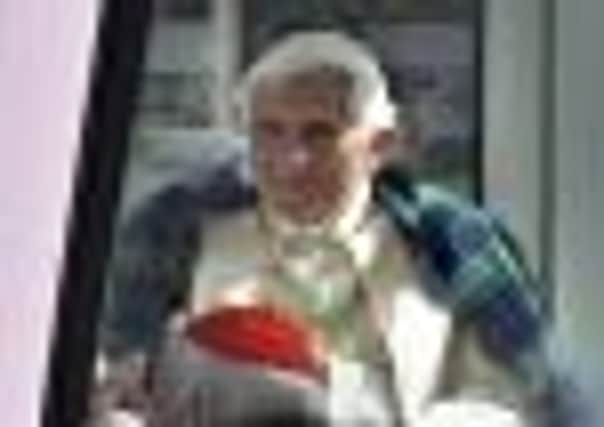Pope’s resignation stuns everyone except his brother


A full spectrum of reaction has been overflowing as the news sinks in that Pope Benedict XVI is to become the first pontiff in almost 600 years to resign, and as tributes are paid to him within and outwith the Catholic community.
His Holiness’s brother, Mgr Georg Ratzinger, said he had known “for a few months” that Pope Benedict was planning to resign – and confirmed that the 85-year-old pontiff was “feeling the burden of his age” and would be unable to make further international trips. However, Georg Ratzinger appears to have been one of the few in the Pope’s inner circle to anticipate the announcement that immediately prompted much speculation about possible successors.
Advertisement
Hide AdAdvertisement
Hide AdCardinal Angelo Sodano, Dean of the College of Cardinals, said those who heard the announcement first-hand had listened “with a sense of loss, almost in total disbelief”. This reaction has been shared by many throughout the Catholic community and the global community, and indeed here in Scotland, where Cardinal Keith O’Brien, who himself nears retirement age under Canon Law, and Archbishop Philip Tartaglia of Glasgow, president of the Bishops’ Conference in Scotland, have been leading tributes to the Holy Father. They have been joined by the First Minister, the Prime Minister and the US president.
Few could have imagined that Pope Benedict XVI – who won over a hostile, secular Britain and turned around media negativity during his visit in 2010, thanks to his gentle humility, his great theological and human insight and his strong faith – would be too frail by 2013 to continue in his vital role.
The Holy Father began his papal visit to the UK in Scotland’s capital, Edinburgh, with meetings with the Queen and Cardinal O’Brien, and he then rallied the faithful during the beautiful and inspiring Papal Mass at Bellahouston, as Pope John Paul II had done almost 30 years before him. His messages in Scotland spoke to youth and elected officials, setting the tone for the entire, successful 2010 UK papal visit.
Pope Benedict appears to have carried his burdens lightly for almost eight years and has shouldered the weight of the modern papacy with courage for as long as he could. He has not only had the responsibility of leading the world’s Catholics, he has been faced with the marginalisation of Christianity in certain part of the globe, the secularisation of our society and the clerical abuse crisis. He has been open about the problems in and faced by the Church, and set about tackling them in constructive ways such as the current Year of Faith, New Evangelisation and strictly enforced procedures regarding abuse.
Let’s also not forget that, while Cardinal Ratzinger, the present Pope worked very closely with the late Pope John Paul II. Blessed John Paul II showed great courage of his own to continue on as pontiff as his health failed in his later years, but his decision to do so was not without its critics and there was great sadness among those watching the dignity of his declining years. It is only after examining his conscience that Pope Benedict has been able to accept that the demands of the modern papacy require more than he can now give to build on John Paul II’s papacy, prompting His Holiness to free the way for a successor sooner rather than later.
Speculation on who the next pope will be is just that – mere speculation at this point. As the Church grows in Africa and the Far East, it would come as no surprise if the next pope originated from one of these areas, or from Latin America, to rebuild the Church and ensure continuity. After all, the election of Pope John Paul II and Pope Benedict XVI is testament to the fact the Church is not afraid to break with the tradition of Italian popes.
However, given how unexpected and unprecedented the resignation is – Celestine V’s 1294 resignation established law allowing popes to resign freely, but the last to resign was Gregory XII (1406-1417) – perhaps a return to an Italian pope will be heralded as the right decision to avoid an extended period of uncertainty.
For now, however, Catholics in Scotland, and throughout the world, are left more than a little sad at the news that the gentle, intelligent man they knew as Pope Benedict XVI will no longer be our Holy Father. As we pray for the pontiff in his remaining years and the challenges that still lie ahead for him, we come to realise the announcement of a new pope by Easter could indeed herald a new spring for the Catholic Church.
• Liz Leydon is editor of the Scottish Catholic Observer.